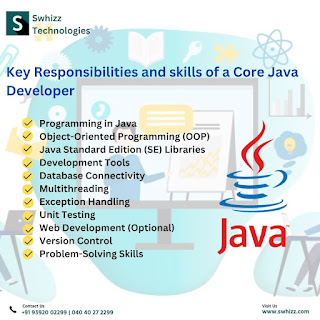Key responsibilities and skills of a core Java developer...!!!
A core Java developer
refers to a software developer who specializes in using the Java programming
language to create applications and software solutions. Core Java is often
considered the fundamental part of the Java programming language and includes
the basic features and libraries provided by the Java Standard Edition (SE)
platform.
Key responsibilities and
skills of a core Java developer may include:
Ø Programming in Java: Proficient in writing Java code to create robust and
efficient applications.
Ø Object-Oriented Programming (OOP): Understanding and application of OOP principles, such
as encapsulation, inheritance, and polymorphism, which are fundamental to Java.
Ø Java Standard Edition (SE) Libraries: Familiarity with the core libraries and APIs provided
by Java SE for tasks such as input/output, collections, networking, and more.
Ø Development Tools: Competence in using development tools and
environments like Eclipse or IntelliJ IDEA for Java development.
Ø Database Connectivity: Knowledge of Java Database Connectivity (JDBC) for
connecting Java applications to relational databases.
Ø Multithreading: Understanding and implementation of multithreading in
Java for concurrent programming.
Ø Exception Handling: Proficiency in handling exceptions to ensure robust
error management in Java applications.
Ø Unit Testing: Familiarity with testing frameworks like JUnit for
writing and executing unit tests.
Ø Web Development (Optional): Some core Java developers may also work on web
development using Java technologies like Servlets and JSP (Java Server Pages).
Ø Version Control: Experience with version control systems like Git for
managing source code.
Ø Problem-Solving Skills: The ability to analyze problems and develop effective
solutions using Java programming.
Core Java developers are
often involved in various stages of the software development life cycle, from
design and development to testing and maintenance. They may work on standalone
applications, enterprise-level software, or web applications depending on the
specific requirements of the project. The role may also involve collaboration
with other developers, testers, and stakeholders in a software development
team.

.png)
.png)
Comments
Post a Comment